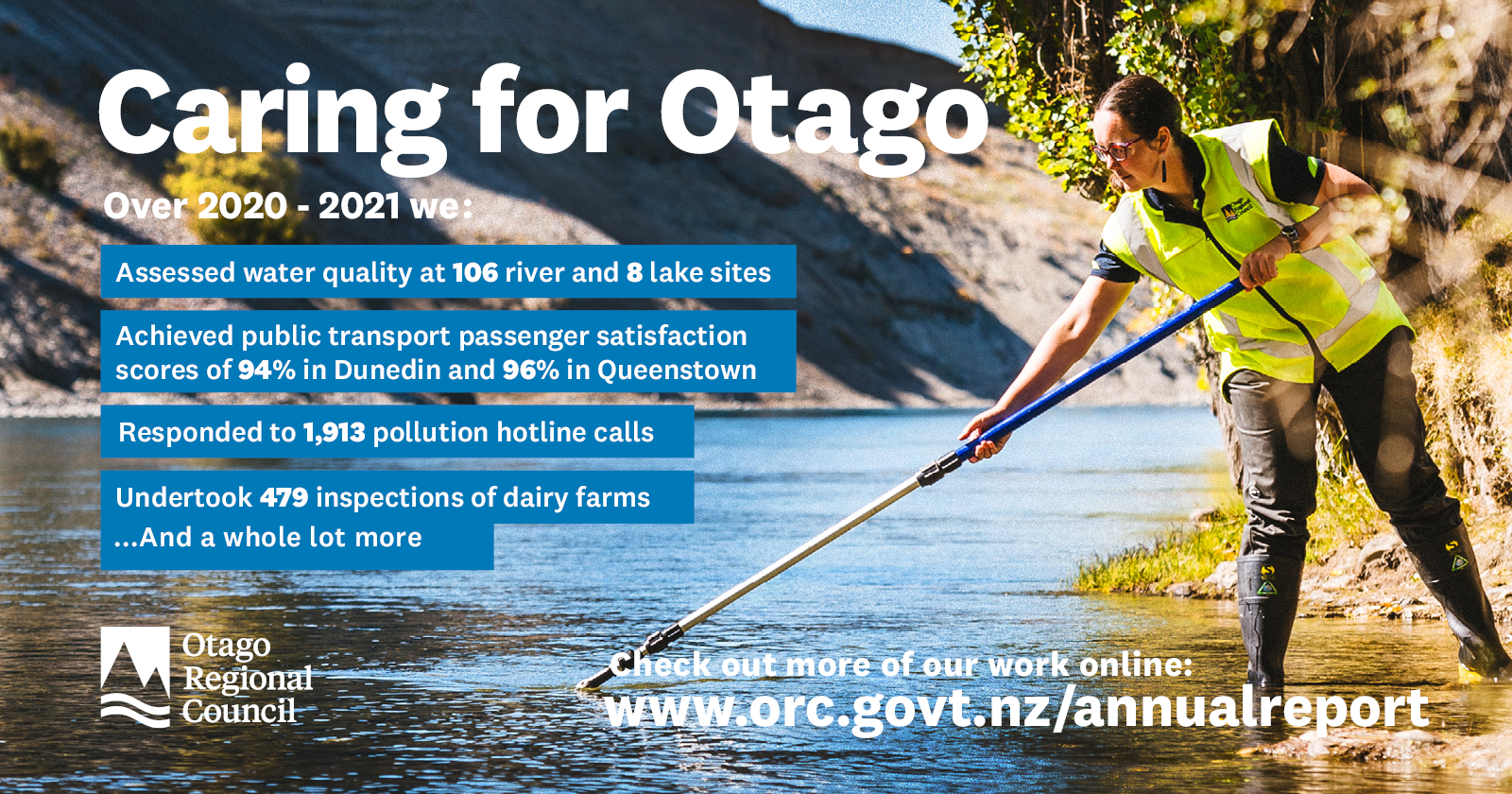Click here to view the full Annual Report 2020-21 and the Annual Report summary.
Chair of the Council, Andrew Noone said the report reflects a significant year of ongoing and new work that is making a difference in all corners of Otago and he is “incredibly proud” of ORC staff.
ORC Chief Executive Sarah Gardner agreed, commenting that ORC not only weathered a year of disruption and change but punched above the organisation’s weight.
“For example, public transport patronage in Dunedin bounced back to levels higher than before COVID, making it the only network in New Zealand to do so during the 2020-21 period,” she said.
During 2020-21, the Otago Regional Council:
- Delivered landmark climate change research, including an inventory of Otago’s Greenhouse Gas emissions, and the region’s first Climate Change Risk Assessment.
- Processed 48 consents on average a month, up nearly 30% over the 37 per month average the year before – all within legislative timeframes.
- Improved compliance monitoring with 479 dairy farm inspections.
- Completed ecosystem mapping in Otago and prioritised sites for active management for the first time - a crucial step to protect treasured plants and animal species.
- Exceeded targets for rabbit inspections and led work to establish community responses to rabbit management at key sites around the region.
- Enabled the environmental work of passionate people in the community, through support for the Otago Catchment Communities umbrella organisation and $200,000 of funding.
- Allocated $250,000 to 21 community-led projects through its ECO Fund.
- Was awarded $5.44 million across four projects in Climate Resilience funding, to renew and repair essential flood protection infrastructure.
- Monitored the region 24/7 throughout the year for flood risks, with Council equipment detecting flows above warning levels 78 times during 2020-21.
Mrs Gardner says the council has taken some of its biggest strides during 2020-21 in public transport, where a new Regional Land Transport Plan and Regional Public Transport Plan were delivered, as well as numerous improvements to the everyday operation of public transport in Dunedin and Queenstown.
“This last year we launched the Bee Card for Orbus services, which comes with extra conveniences for bus users. We also launched real-time bus information through the Transit app and continued to monitor and tweak the networks.
“Passengers responded positively, with excellent passenger satisfaction levels in both Dunedin and Queenstown.”
In other highlights, ORC developed and notified a Proposed Otago Regional Policy Statement, significantly progressed essential plan changes to the existing Water Plan, plus planning towards a new Land and Water Regional Plan, and boosted science work – collecting a wealth of data to support the new Land and Water Regional Plan, through habitat studies, groundwater monitoring, surface water assessments, and soil research.
ORC has also significantly grown its involvement and capacity in urban development, an emerging focus for the council, during 2020-21.
“We’re also strengthening our collaboration with city and district councils to face climate change and natural hazard risks in Otago, particularly around South Dunedin, the Clutha delta and the head of Lake Wakatipu,” Mrs Gardner said.
Mrs Gardner said she was particularly proud of the work of ORC to strengthen relationships with iwi partners and encourage the use of Te Reo and Tikanga Māori in daily operations.
“We’ve solidified relationships with Kāi Tahu, and we’re committed to continuing this work further.”
The Annual Report 2020-21 organises ORC performance measures into six groups: Environmental, Regional leadership, Regulatory, Flood protection and river management, Safety and hazards, and Transport.
“We know that people in Otago are passionate about their environment and they want to see healthy waterways, clean air, and sustainable land use. Our environmental programme is expanding to respond to these community desires and government reforms,” Mrs Gardner said.
“An enormous amount of work goes on behind the scenes, across virtually every part of our organisation, to develop and deliver enduring and practical policy documents that determine Otago’s future,” Mrs Gardner said.
Chair Noone urged people to read the annual report summary to better understand what motivates and occupies ORC especially as a way learning the difference between the organisation and its work and what other councils do in Otago.
Key stats
- Assessed water quality at 106 river and 8 lake sites.
- 83 retained the same water quality grade; 20 improved and 11 degraded.
- 5,081 pest plant inspections completed.
- Facilitated wilding pine control operations across 35,000+ ha.
- Funded 21 projects through the ECO Fund.
- Responded to 1,913 pollution hotline calls.
- Completed 479 dairy inspections.
- Processed an average of 48 resource consents per month, over 37 in 2019-20.
- Achieved public transport passenger satisfaction scores of 94% in Dunedin and 96% in Queenstown.
- Grew patronage in Dunedin by 6% over pre-COVID rates, to 2,706,191 passenger trips in the year.

